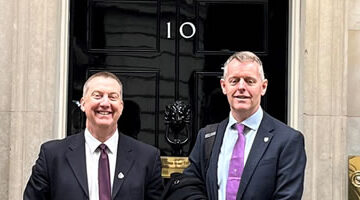President’s Blog August 2015
August, and for some the prospect of a well deserved holiday; whilst for others the sense of déjà vu, as we explain the bones of the carpus, ‘reveal’ the secret of good medicine is in taking the history and pointing out that the discovery of CRP is not on a par with the discovery of penicillin!
I have just finished writing a short ‘speech’ that I will be making at the Palace of Westminster next week when we launch the Fact Sheet that I have previously referred to. We have over 40 MPs attending as well as the Secretary of State and a number of journalists. We have also commissioned a short animated film to make many of the key points; it is available on the RCEM website for all to see.
This will be my third meeting with the Secretary of State in the last four weeks.
The other meetings have focussed on preserving the four hour standard – which some wish to abandon – and highlighting the need to negotiate terms and conditions that promote equitable, sustainable careers.
Our STEP campaign is now widely known and earlier this month received a welcome endorsement in the form of a joint report with the Patient’s Association. ‘A Time to Act’ highlighted what we all know. ‘A&E’ is a powerful brand that draws patients – confident of its availability (24/7), its quality (high satisfaction levels) and accessibility (just follow the road signs). The College argues that
Emergency Medicine is only one component of what an ‘A&E’ should provide.
The Emergency Department must be reinforced by other key services such as out of hours primary care, mental health teams, district nursing services and other key components of urgent care.
I hope by now that the NHS England report ‘Safer, Faster, Better’ will have been published. We expect it to be published by the end of June and having been consulted on its contents we have agreed to co-badge and endorse the guidance. It is a very useful guide to Trusts and CCGs. Not surprisingly it restates most of the conclusions in the RCEM report published last year, entitled ‘Prescribing the Remedy’!
The gap between winning an argument and changing the behaviour and decisions of others is without doubt the most difficult to bridge. It can only be done by repetition, stamina and engagement. I appreciate that for Fellows and Members this can sometimes be seen as ‘more of the same’. However to the people and organisations we need to influence it means ever fewer
reasons to have not heard, not understood or not acted upon our cogent, well informed and clearly articulated agenda.
September will be Party Conference season and we will ensure we continue to press our case. It will also be our own Scientific Conference – and Manchester promises to be a great showcase for both the breadth and depth of emergency medicine. Our specialty and UK EM continues to prosper despite the myriad challenges. The EMJ has increased its circulation, has the highest social media
profile of any BMJ publication and a steadily rising impact factor. Within Europe we have the most well established and academically mature system of emergency medicine training. This August will see the highest ever number of EM trainees in post and the prospects for the next two years are of even greater numbers.
The key challenge therefore is to ensure we retain all those that we train. Attrition wastes taxpayers money, diminishes patient care and overburdens colleagues. This simple, inescapable logic will continue to inform our conversations with the BMA and NHS Employers. They must be held to account over this – resource wastage cannot be accepted, particularly in the current financial climate.
The BMA must recognise that it has said too little, too softly when it comes to high frequency out of hours specialties. NHS Employers must recognise that an ED locum spend of £500 million in the last three years alone, represents appalling value for money; whilst headlines reporting the issue simply add insult to injury to trainees and consultants alike.
I would urge all EM members of the BMA to write to the Chair of Council of the BMA to make these points. A template for the letter is available on the RCEM website – all you need to do is print it off, sign and post it – it is imperative we make our voice heard and there is no more powerful voice than the ‘troops on the frontline’.
The negotiations around new contracts are beginning again in earnest. Next week I will be meeting with Lord Prior – erstwhile chairman of the CQC and now Parliamentary Under Secretary of State for Health – whose remit includes the new contracts. The College is not a trades union but our Charter charges us to ‘raise standards in emergency care’. This can only be done with a work force that is well trained, stable and sufficient to the task. I make no apologies therefore in arguing for equitable terms of employment.
Dr Cliff Mann FRCEM FRCP
President
The Royal College of Emergency Medicine
@RCEMPresident


0 Comments